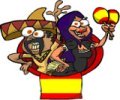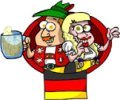Verb Tenses - Learning the Parts of the Verb
Verb Tenses. Learning the Parts of Verbs will help you in your language learning quest.
Verbs are doing words, action words.
They give life to sentences, speech and to conversation. They put sentences into action.
Verbs have a number of components.
Parts of Verbs: Tenses and Moods
Verbs are like people - they can be tense, and they change moods!
What is the TENSE of a Verb?
Tense means TIME.
A verb takes place in a period of TIME. This is called a TENSE. It is derived from the Latin word for time, which is tempus.
In Spanish the word for tense is el tiempo, which is the same word as for time.
In French the word for tense is le temps, which is also the same word as for time.
In German the word for tense is die Zeit, which is also the same word as for time.
In Italian the word for tense is il tempo, which is also the same as the Italian word for time.
Get the point. The TENSE of the verb is the TIME it took place.
There are THREE points of TIME.
The Three Points of Time in Verbs
In general terms, verbs are either in the:
- Past
- Present
- Future
What is the MOOD of a Verb?
During a time period (tense) a verb might take on a different character or mood. The MOOD of a verb describes whether the verb is:
- indicative - is when something is actually happening, or happened or will happen.
- conditional - when something would or could happen if a certain condition is met.
- subjunctive - when there is some doubt as to whether something will happen, or some desire.
- imperative - where one demands that something happens or one demands someone do something.
Perfect Tense and Imperfect Tense
Verbs can also be PERFECT or IMPERFECT.
Something that is PERFECT is complete, finished, whole, done.
You cannot do another thing to it.
You cannot add to it.
You cannot change it.
It is over. Over and out.
A building that is perfect is finished, totally complete. Finito.
A painting that is perfect is finished, totally complete. Done.
A sculpture or invention that is perfect is finished, totally complete.
So consider an ACTION that is done and dusted, over and out, completed, finished....
That action is called PERFECT.
I did that. It is perfect. Finished. Done.
PERFECT.
A PERFECT TENSE
So a present perfect verb tense is completed now.
Like I have completed that.
Have is in the present, and completed is in the past.
It is done so it is perfect.
Present perfect.
A past perfect verb - is in the past and it is completed (perfect).
I had completed that.
Had is in the past, and completed is finished, so therefore perfect.
Past perfect.
(Just to confuse you some texts will use the word anterior, which also means past. Anterior perfect. Sounds soooo much more intellectual than past perfect.)
A future perfect verb will be completed in the future.
For example, I will have completed that by next Tuesday.
Will have is in the future. Completed is perfect because it is finished.
Future perfect.
A conditional perfect verb would or could have been completed.
For example, they would have flown to Paris.
Would is conditional, and have flown is in the past, done and dusted, so it is perfect.
Conditional perect.
IMPERFECT Tenses
IMPERFECT is something that is not finished.
So an action that was on-going, that was continuous is deemed to be imperfect.
So things like:
- I was singing in a choir for 3 years when I was young,
- I used to be a big fan of the Beatles
- We lived in Paris for 15 years
These tenses are called IMPERFECT.
Get it!???
See how understanding the parts of a verb, and the verb tenses is not that tricky when you know how! Various texts use different variations on the names, but you will be able to unravel their meanings using the same logic as described above.
Learning Tenses of Verbs in French, Italian and Spanish
To really learn your French, Italian or Spanish verbs, tenses, moods and conjugations with unforgettable Memory Triggers check out our various courses.
Our ITALIAN GRAMMAR SLAMMER course has TENSE CHARACTERS, to remind you of the various tenses. These are cartoon characters whose pictures remind you of the verb. For example for the Conditional verbs (WOULD) we use Tiger WOODS who WOULD do something. Watching the various cartoons of Tiger WOODS helps remind you of the endings of various conditional verbs in Italian.
The Excelerated Spanish Verbs Course, also uses TENSE CHARACTERS to remind you of each of the verbs and conjugations. (Again each tense is given a cartoon character to remind you of it and the conjugations and the verb endings).
There is no more powerful way of learning Spanish verbs!
Now that you know the VERB TENSES and MOODS you need to know CONJUGATION
OK, now that you know the VERB TENSES and MOODS, you need to now know how know about CONJUGATION. Conjugation is the act of adding the endings to the verbs according to who is doing the action, and when.
Check you the discussion about the conjugation of verbs for the different pronouns (I, you, he, she, it, we, they etc).
200 Words a Day Language Learning Home Page |
Learning Spanish Verbs and Verb Tenses |
Learning French Verb Tenses | Learning German Verbs | Learning Welsh Verbs | Learning Italian Verbs
200 Words a Day! Accelerated Language Learning Software -
Superlearning Verbs and Languages the accelerated way - made easy
200 Words a Day! and Exceltra
©Copyright
2004-2023 All Rights Reserved
Verb Tenses
IMAGINE how you'd
FEEL
seeing yourself learning at a rate of 200 words a day ... the ideal companion course that complements any language course.
|










New! Comments
Have your say about what you just read! Leave us a comment in the box below.